Pea protein powder is a highly pure, vegan-friendly source of protein derived from peas that can help you build muscle, gain strength, and drop fat.
If you are looking to avoid dairy-based proteins like whey and casein, pea protein is one of your best alternatives. It’s highly concentrated, and it has a robust, well-rounded amino acid profile to help improve your recovery, boost your performance, and lead to a leaner, stronger physique.
Does that sound like what you want? Our research team has studied and ranked the ten best sources of pea protein below, so check it out.
Research
Rankings
1. Ladder Plant Protein Powder
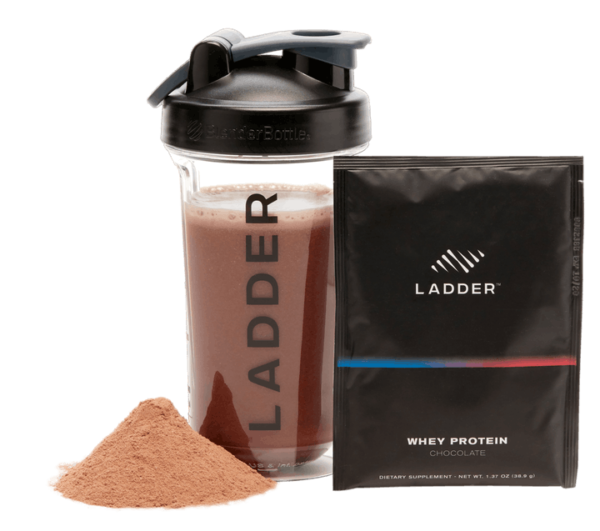
Ladder plant protein is NSF-certified and offers a complete amino acid profile (unlike any others on this list) for maximum muscle building support. It also comes with probiotics in every serving to ensure better absorption.
Each batch is tested to ensure it is free of lactose, fillers, artificial sweeteners and colors. It is also scientifically designed to limit protein clumping so that it mixes well and provides a smooth and enjoyable taste.
Without a doubt, this is BodyNutrition’s #1 pea protein powder.
2. NorCal Organic Pea Protein
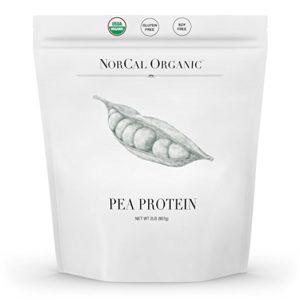
Sourced from organic peas and grown in the United States, NorCal Organic is a great, simple pea protein for several reasons. First, its organic certification means it is less likely to contain traces of pesticides.
Additionally, its purity is certified by an independent third-party laboratory. While some people might prefer it in a plastic tub instead of a resealable plastic bag, that’s not enough to prevent it from being one of the top overall pea protein powders on the market.
3. Naked Pea
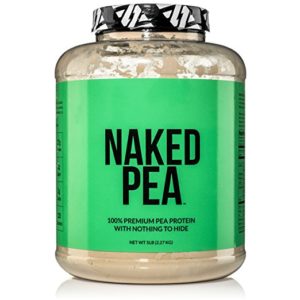
Naked has built a great reputation as a source for extremely pure and natural supplements, with nothing in the way of extraneous ingredients or fillers.
Their pea protein supplement is a perfect example of this, and Naked Pea is one of the best single-ingredient pea protein supplements out there.
4. Anthony’s Premium Pea Protein
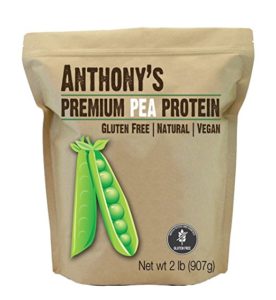
Anthony’s Premium Pea Protein is a solid source of 100% pure pea protein isolate. It’s tested and certified gluten-free, meaning it has passed rigorous testing for the presence of gluten from cross-contamination during the manufacturing process.
The resealable bag is a little less convenient than a plastic tub, but that’s about the only fault you can find with this pea protein supplement.
5. BulkSupplements Pure Pea Protein
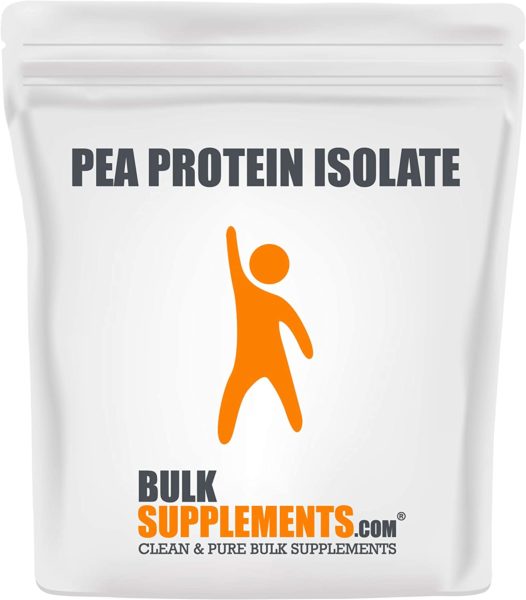
BulkSupplements delivers again with its high-volume and high-purity pea protein supplement, available in up to 20 kilogram bags.
While other products might have a leg up with regards to organic certifications and other perks, BulkSupplements should still be your top priority if you go through tremendous quantities of protein.
6. Smart138 Pea Protein
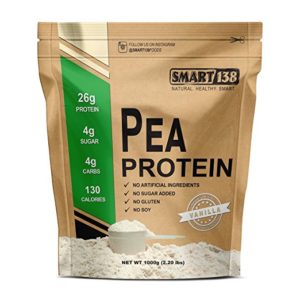
Smart138 is one of the best sources for pea protein if you dislike the slightly chalky and mildly vegetal taste of raw, unflavored pea protein powder.
This pea protein powder is flavored with natural vanilla flavoring and monk fruit extract, a natural non-caloric sweetener. With few other pea proteins that are flavored, and fewer still that are flavored without sugar or artificial sweeteners, Smart138 stands out from the crowd.
7. TerraSoul Superfoods Pea Protein Powder
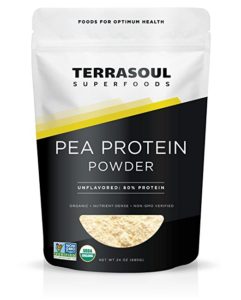
TerraSoul is a good brand of pea protein if you want your protein from organically grown peas. It uses pea protein isolate, the purest form of pea protein, and comes in three options (1.5, 3, and 4.5 pound bags).
It’s a good choice if you want to buy large amounts of bulk pea protein that is also organic.
8. Now Sports Pea Protein
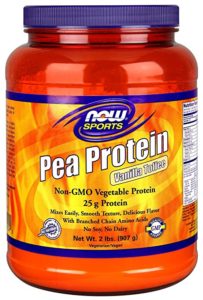
Now Sports offers up a pretty simple pea protein supplement whose only ingredient is pea protein isolate from yellow peas.
The pea sources are non-GMO, and the supplement carries the “Tested for Sport” certification, meaning an independent lab has tested and certified that this supplement contains no banned substances in sports competition. It’s naturally flavored and has an emulsifier, making it a little easier to mix into shakes and smoothies, at the expense of more ancillary ingredients.
9. Orgain Organic Protein
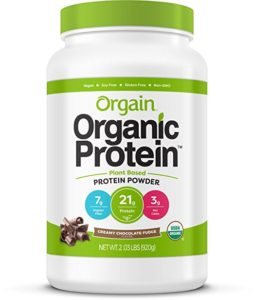
Orgain is a blend of a variety of plant proteins, but its main constituent is pea protein. It employs rice protein and chia seed alongside to bolster the amino acid content of pea protein, which is slightly weak in a few essential amino acids.
It’s flavored with a mix of erythritol and stevia, which is less than ideal: some people get digestive when consuming large amounts of this synthetic sweetener.
Surprisingly, even with these non-caloric sweeteners, this supplement is fairly high in carbohydrates, making it difficult to recommend for low-carb dieters. Even when it comes to flavored pea protein supplements, there are better options out there.
10. Naturade Plant Based VeganSmart Pea Protein
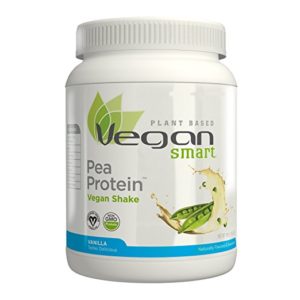
Naturade is somewhere in between a protein shake and a sports drink. It uses pea protein isolate to deliver a high dose of protein, but it’s also got cane sugar, corn syrup, and sea salt for sugar and electrolyte content.
As you’d probably guess, the carbohydrate content of this protein supplement is fairly high, at 8 grams of carbs for every 20 grams of protein.
Still, if you are an athlete who needs a rapid recovery drink, this is a good choice for replenishing your carbohydrate stores and jump-starting muscle recovery.
Category winners
Best pea protein overall: Ladder Protein
Ladder Protein is our favorite overall pea protein thanks to its innovative blend of all-natural flavoring, low-sugar sweetening that uses all-natural compounds like stevia, and probiotics. On top of that, the taste is fantastic, making it an easy pick for our number one spot.
Best pea protein for women: Ladder Protein
For women who are serious about workout recovery, Ladder Protein offers something beyond your typical protein powder. In addition to enzymes and probiotics, Ladder also provides iron, a key mineral that’s often lacking in female athletes’ diets.
Best pea protein for weight loss: Naked Pea
Naked Pea comes in bulk, making it a great choice if you want to incorporate pea protein into a dieting plan as a part of a meal replacement shake. Plus, unlike some other options out there, it’s sugar-free, which keeps the carb content as low as possible.
Best organic pea protein: NorCal Organic Pea Protein
Want your pea protein to be as pure as possible? NorCal makes a pea protein supplement that’s 100% pure, unflavored, and certified organic, so it’s an easy pick if purity matters to you.
Best pea protein for athletes: Ladder Protein
Ladder Protein is specifically designed for the stresses on your body that come along with serious training. In addition to pea protein for muscle repair, Ladder provides enzymes and probiotics to sustain a healthy gut biome, plus electrolytes to replenish trace minerals like calcium and potassium.
Best unflavored pea protein: NorCal Organic Pea Protein
If you don’t mind the taste of plain protein, or you know you’ll be mixing your pea protein into smoothies or shakes, NorCal Organic Pea Protein is a great choice. It’s super pure and blends up easily alongside other ingredients.
Who should buy pea protein?
Pea protein is great for all individuals and helps to support muscle growth, digestive functioning, and recovery. Vegans and people with allergies will greatly benefit from using this type of protein since it isn’t derived from animals. People looking for weight loss can also benefit because it is low carb, low fat, low calorie, and high protein.
There should be no issues for pregnant women or children taking this supplement. However, always consult a medical professional before starting any sort of supplement regimen.
How we ranked
The first thing we looked at, when formulating our rankings, was the form or pea protein powder. Source Naturals pea protein powder comes in concentrate form, which tends to have more fillers. It is also less biologically active, which is why it ranked last. Naturade ended up a little higher for providing a pea protein isolate product, which is much cleaner.
However, its addition to various sugars such as corn syrup led it to rank near the bottom. Orgain provides a solid vegan protein mix that includes pea protein with a high amount of carbohydrates. It also uses non-friendly GI tract sweetness like stevia and erythritol.
TerraSoul provides a clean pea protein that is sourced from only organically grown peas but falls short for providing a slightly chalky tasting protein powder. Smart138 pea protein is one of the best tasting vegan proteins available but uses a lot of artificial sweeteners to do so. BulkSupplements provides one of the best pure pea proteins in terms of value, providing 42lb bags. It is not organically certified, which is why it didn’t rank in our top 3.
Anthony’s Premium Pea Protein made our top 3 for proving a purpose isolate protein that’s been rigorously tested to ensure it’s free of allergens. We would’ve preferred a tub over a resealable bag, but that’s our only complaint. Nakedprovides a pure product with just a single ingredient: 100% pure pea protein isolate. Its commitment to purity and minimalism is why it ranked near the top. NorCal Organic took the top spot for providing one of the only organic-certified pea proteins on the list that was also independent third-party tested for purity.
Benefits
The high protein concentration of pea protein can help keep weight off after dieting. One of the toughest things about dieting isn’t actually losing the weight—it’s keeping it off once you’ve lost it.
A high-protein, low-carb supplement like pea protein powder can make a big difference. Initial evidence that supplemental protein has a beneficial effect on weight maintenance after a dieting program comes from a 2005 study published in the International Journal of Obesity (1).
In the study, over 100 volunteers underwent the same dieting protocol, then were randomly assigned to either a supplemental protein group or a control group during the three month follow-up period. The protein group received a supplement with 50 grams of protein power day, while the control group followed standard post-diet advice.
The results showed that the group that received the supplemental protein regained 50% less weight than the control group. Moreover, that was only fat mass, highlighting the role that concentrated sources of protein play in building muscle and dropping fat.
Replacing carbs with pea protein can cut down on hunger and increase fat burning. A review study published by two researchers at Harvard School of Public Health examined the effects of replacing dietary carbohydrates with protein among people who have lost or are actively losing weight (2).
According to the authors, replacing carbs with protein is advantageous for two reasons: first, greater protein intake induces a feeling of fullness, wich nutritionists call “satiety.” This just means your body isn’t feeling hungry anymore. The second benefit of high protein intake is that it induces thermogenesis, which is an up-regulation in your body’s baseline metabolic rate to burn more fat and produce more energy.
You burn more calories at rest after a meal that’s high in protein than you do after one that’s high in carbohydrates. Pea protein, with its very high protein content and its extremely low carbohydrate content, is an ideal source of protein to tamp down on hunger and to kick-start your metabolism.
These mechanisms likely explain why protein supplements appear to help with both weight loss and weight loss maintenance.
Conventional weight loss wisdom, which dictates that “a calorie is a calorie,” would suggest that taking in additional calories in the form of protein is counterproductive, but the latest nutritional evidence suggests otherwise.
Pea protein can help vegetarians and vegans gain muscle mass. One of the biggest concerns with a vegetarian or a vegan diet is that it becomes more difficult to gain muscle mass when you are an athlete in training.
This has been documented in scientific research. One study published in 1999 found that men who consumed an omnivorous diet gained more lean body mass over the course of a 12 week training intervention compared to a group of men who ate a vegetarian diet (3).
The good news is that supplementation with pea protein can counteract this problem.
According to a review article on protein sources published by Jay R. Hoffman and Michael J. Falvo at the College of New Jersey, supplementation with plant-based protein such as pea protein can counteract the tendency of vegetarian and vegan diets to make it more difficult to gain lean body mass (4).
Plant sources of protein can be just as beneficial as animal sources. A study published in 2013 in the Nutrition Journal sought to compare the effects of an animal-based protein supplement (whey, in this case) and a plant-derived protein supplement on athletic performance gains over the course of an eight week training intervention (5).
A group of college-aged athletes were randomly assigned to either an animal-derived or plant-derived protein supplement, and all underwent the same training for eight weeks.
At the study’s beginning and end, the researchers tested the athletes’ body composition, strength, and power. They found no differences between the groups, though each group increased their strength, lean body mass, and power over the course of the study, and decreased their fat mass.
The fact that there was no difference across groups implies that plant-based proteins like pea protein can deliver the same benefits as you’d get in an animal-based protein powder like whey protein, so vegetarians and vegans who supplement with pea protein need not worry that they’d be better off with whey or casein.
Side effects
Like other protein powders, pea protein is exceptionally safe since it’s derived from yellow peas—one of the most mundane and safe foods out there.
Pea protein’s only weakness is a modestly low level of tryptophan and methionine, two essential amino acids.
However, these amino acids are common in other foods like seeds, soy protein, cheese, eggs, and beans, so it’s unlikely you’ll run into problems due to a lack of these amino acids, unless pea protein powder is your only source of dietary protein—and if that’s the case, you’ve likely got bigger issues.
Recommended dosage
Athletes should aim for 1.2 to 1.4 grams of protein per kilogram of body mass per day, if they are runners, cyclists, or other endurance athletes.
Weightlifters and other strength, speed, and power athletes need to aim higher: 1.4 to 1.8 grams of protein per kilogram of body mass per day, according to research by Peter Lemon at Kent State University (6).
As for those looking to keep off weight lost during a dieting protocol, the minimum amount of supplemental protein (in addition to your regular dietary intake) appears to be 30 grams per day, and 50 grams per day might be better.
Since pea protein isolate, the purest form of pea protein, is 80% protein by weight, you’ll have to divide that amount by 0.8, arriving at a range of 38 to 63 grams of pea protein isolate per day.
FAQ
Is pea protein considered the best plant based protein source? Yes, pea protein is possibly the best plant-based source of protein. It’s got a strong amino acid profile, and many vegan protein powders use pea protein as their primary constituent.
Because of its high purity, extremely low carbohydrate content (practically zero for pure pea protein isolate) and well-balanced amino acid profile, pea protein powder is the perfect solution for increasing muscular strength and shifting your body towards gaining muscle instead of fat. It’s equally valuable for athletes in training and dieters trying to lose weight.
Does pea protein contain purines? Pea proteins can contain purines, which can have both positive and negative effects on the body. Purines have been found to affect kidney stones and digestive disorders like IBS negatively. However, purines have also been shown to be protective against gout (7).
If you have any sort of digestive disorder, you might want to stay away from pea proteins to be safe.
Can pea protein improve satiety? Yes, pea protein can help improve satiety and be a useful supplement for treating obesity. It seems to suppress the release of ghrelin, which is also known as the hunger hormone.
What is pea protein? Pea protein comes directly from the yellow pea plant and contains the same nutritional value as yellow peas. That makes pea protein a high-quality protein source that also contains amino acids, iron, and fiber.
Pea protein is unlike other protein supplements because it’s vegan and is hypoallergenic. It’s a great alternative to the more common protein powders out there, and it’s less likely to cause negative side effects commonly associated with many protein powders. Pea protein is most recognized for its ability to build muscle, promote heart health, and improve weight loss.
Why is pea protein so popular? Pea protein is popular because, in recent years, people started demanding clean, safe, and vegan alternatives to their regular health supplements.
Not only does pea protein provide you with ample amounts of protein, but it does so without exposing you to animal by-products common in other protein powders. That makes these products especially useful for those avoiding animal products and those allergic to the ingredients found in usual protein products.
How many calories are in pea protein? Most pea protein products have fewer than 100 calories per serving, which is much lower than whey protein. In addition to having fewer calories than other types of protein products, pea protein also has decent levels of protein per serving, containing anywhere between 15 and 30 grams of protein per serving.
Is pea protein better than whey protein? After an eight-week study during which participants engaged in high-intensity strength training programs, there were no significant differences between strength, body composition, and performance in those taking pea protein and whey protein. Participants equally improved their one-repetition maximums for several exercises and developed strength when performing deadlifts and back squats. All participants experienced an increase in muscle thickness as well as advanced force production (8)
In another study, researchers analyzed the effects of these two types of protein in individuals returning to muscular strength training. Pea protein provided the same benefits as other types of protein, making it a solid alternative to those unable to or disinterested in regular whey protein (9).
Does pea protein make you gain weight? Pea protein powders have fewer calories than your average protein products, allowing for less possibility of weight gain. These products are also highly capable of boosting your metabolism while reducing your appetite, which can result in weight loss over time.
Does pea protein reduce high blood pressure? Pea protein may play a role in managing and reducing high blood pressure. Studies show that the introduction of plant foods, such as pea protein, can reduce the effects of high blood pressure (10).
Is pea protein keto-friendly? The ketogenic diet, or, keto, has several guidelines for selecting the appropriate foods. Keto strongly suggests reducing your daily intake of sugar and carbohydrates. Pea protein powders usually max out at about 1 gram of carbohydrates per serving and absolutely no sugar.
In addition to keeping your carbohydrate intake low and boosting your protein intake, pea protein does not cause a dramatic spike in blood sugar levels. All of these features make pea protein a perfect protein product for anyone on a ketogenic diet.
Does pea protein spike insulin? If you’re diabetic or are simply maintaining a ketogenic diet, it’s sometimes difficult to find a protein supplement that does not cause a dramatic spike in insulin levels.
Unlike many protein powders, pea protein has a low glycemic index and does not cause much of an effect on insulin levels. The glycemic index is a scale that describes how much a product will impact your body’s blood sugar levels. The greater the number, the more likely your levels will spike. With a low glycemic index, pea protein is a solid choice for those with unstable blood sugar levels.
Is pea protein low in methionine? Yes, pea protein is low in methionine, which is one of the nine essential amino acids (11).
This can be combated by adding some brown rice to your diet.
Does pea protein affect hormones? Many protein products have the ability to affect your hormone levels because they contain dairy products that already contain animal hormones. Though pea protein can provide you with all the benefits associated with whey protein, your hormone levels won’t be affected.
This is because pea protein is a plant-based protein that’s not an actual complete protein. Despite containing all nine essential amino acids, it does not cause the negative side effects that may be associated with complete proteins.
Is pea protein vegan? When you’re consuming a vegan diet, it can be difficult to get adequate levels of protein as protein is often associated with dairy products or meat. Though there are plants that contain protein, you usually have to consume very large amounts to make any sort of impact on your daily protein intake. Pea protein is 100% vegan because it comes directly from yellow peas without any additional ingredients or additives. Unless you’re buying a protein product that mixes pea protein with other types of protein, there is no concern about contamination with animal products.
Does pea protein cause constipation? Many people believe that pea protein causes constipation because peas are considered legumes. Legumes are often associated with a negative impact on the digestive system and its functions.
Though this is mostly true for peas, many of these qualities are lost in the production of pea protein powders. That means there are significantly less fiber and starch in the final product, which means less of an effect on your digestive system. However, consuming pea protein in large amounts could result in negative digestive system side effects.
Does pea protein cause inflammation? No, pea protein does not cause inflammation. In fact, pea protein can actually provide anti-inflammatory benefits to consumers due to the high amounts of antioxidants in every serving. Antioxidants help boost the immune system, which helps your body fight off infections and reduce systemic inflammation. This also makes you less susceptible to chronic diseases and conditions.
One of the other benefits associated with pea protein is that it does not contain any allergens – which significantly reduces the chances of experiencing inflammation as a result of an allergic reaction.
Where can I buy pea protein? Pea protein powders can be purchased in various health food stores and found online.
Does pea protein have any negative effects on your GI tract? There aren’t any negative side effects caused by consuming pea protein unless you’re sensitive to fiber. An increase in fiber can cause gastrointestinal upset, such as gas, bloating, and constipation. By reducing your intake, you should return to normal rather quickly.
Can you bake with pea protein? Yes, you can bake pea protein into any of your favorite treats and is often used to replace flour to make products gluten free. Doing so, however, can severely impact the texture, consistency, and taste of the final product.
Is pea protein nutrient-dense? Pea protein is loaded with nutrients that can provide various health benefits, including muscle growth, strength, and muscle thickness. They also do this without containing various allergens, so people with food sensitivities can consume it without any issues (12).
Other than protein, pea protein includes plenty of fiber and vitamins without the fat and cholesterol that’s typically associated with animal protein.
Is pea protein bad for your kidneys? No, pea protein is safe for your kidneys. In fact, it can help to boost the health of your kidneys with long term usage. This is especially true if you have pre-existing issues with maintaining your blood pressure. Pea protein has been shown to reduce the damage to the kidneys caused by high blood pressure. If you currently have some type of kidney disorder, it’s best if you speak with your doctor first before adding pea protein to your daily regimen.
Does pea protein contain a lot of salt? Pea protein can contain a lot of sodium to improve it’s consistnecy. If you have high blood pressure, this may be an issue for you.
Does pea protein have all the essential amino acids? Most pea protein contains all essential amino acids, including methionine, phenylalanine, threonine, lysine, isoleucine, tryptophan, histidine, valine, and leucine (13).
Does pea protein contain iron? A single serving of pea protein contains up to 35% of your daily recommended iron intake. Compared to meat, the iron found in pea protein is absorbed quite slowly. However, by adding vitamin C, you can significantly speed it up.
Related articles
Recap
Pea protein is a great, vegan-friendly source of protein that’s highly concentrated and can deliver the same athletic and weight loss maintenance benefits as whey protein and other animal-based proteins.
Both athletes and dieters can benefit from pea protein, though guidelines on optimal dose depend on the specific application.
Vegetarians and vegans, who can have difficulty maintaining lean body mass without specific dietary protein supplementation, are especially good candidates for including a pea protein powder as part of their daily diet.
For BodyNutrition’s #1 pea protein recommendation, click here.